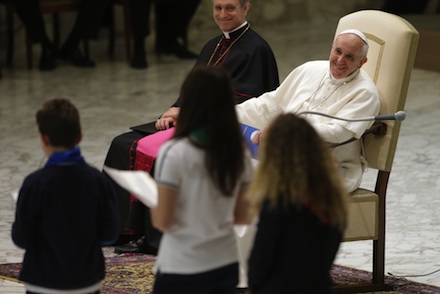Francis says he didn’t want to become Pope – and I truly believe him
You have to go back centuries to find the last ambitious schemer to be elected pope
By Fr Alexander Lucie-Smith on Friday, 7 June 2013

Pope Francis told children he had no ambition to lead the Church (AP)
The Pope has revealed, if that is the right phrase, in a meeting with schoolchildren, that he did not want the job. It is, of course, the case that when a cardinal gets the necessary two thirds plus one votes, he is approached by the cardinal chamberlain, who asks him: “Acceptasne electionem?” This is in Latin, a language that all cardinals know, so there can be no mistake. Being willing to accept election, Cardinal Bergoglio would have answered “Accepto”, and in that moment, he became Pope.
There have been cases where a cardinal has declined election, or so it is thought. One such may have been Cardinal Pole; though, as conclaves are secret matters, no one can be sure.
But, while Pope Francis did not refuse election, and indeed gave a positive acceptance, in another sense what he says is true. He did not want the job. Unlike, let us say, Pope Alexander VI, he did not spend his every waking moment as a cardinal desperately hoping to be elected Pope and working towards that end. Pope Francis strikes me as someone who is quite free from the taint of ambition. It is my guess (and it cannot be more than a guess) that this may have been one of the reasons he was elected. The other cardinals saw his lack of ambition as a good quality in a Pope; and they saw perhaps, among their more ambitious brethren, shall we say, the sort of thing that should not be elevated to the throne of Peter.
While on this subject, the same must have been true of Cardinal Ratzinger some eight years ago. He, like Cardinal Bergoglio, had reached an age where most of life’s ambitions had been satisfied. As with Cardinal Bergoglio, I am sure all his ambitions were good ones.
Ambition, or the desire to get to the top, or just to ascend to a position of greater power, is a serious sin. It is the one thing that Our Lord condemns again and again in the gospels. Indeed, Christians are supposed to vie for the lowest place, and in being crucified, Jesus showed us just what the lowest place looked like. This was his true glory. The glory that the ambitious seek is the tawdry glory of self-love and self-aggrandisement, not the love of others, which is our true glory.
If ambition is a serious sin, it is particularly foul in the clergy and the upper clergy in particular. All the truly great prelates of the Church have been humble men. It is particularly interesting to see what the Pope says about clerical ambition.
We read: “‘Someone who wants to be pope does not really like themselves,’ the pontiff said laughing.” But there is a serious point here. The cleric who falls into the sin of ambition really wants to be what he is not; he wants to be a power in the land rather than a servant to all; therefore he does not really love or even like his vocation as a priest. He cannot be very happy. Indeed, there are few sadder or more ridiculous sights than an ambitious cleric.
Thank the Lord for Pope Francis! Indeed, thanks the Lord for all the good popes we have had. One has to go back many centuries to find the last ambitious schemer to be elected pope – almost as far back as the infamous Rodrigo Borgia, who became Pope Alexander VI. But let us not be too tough on him: he really didn’t like himself; and as it turned out he was not a bad Pope in many respects.
No comments:
Post a Comment